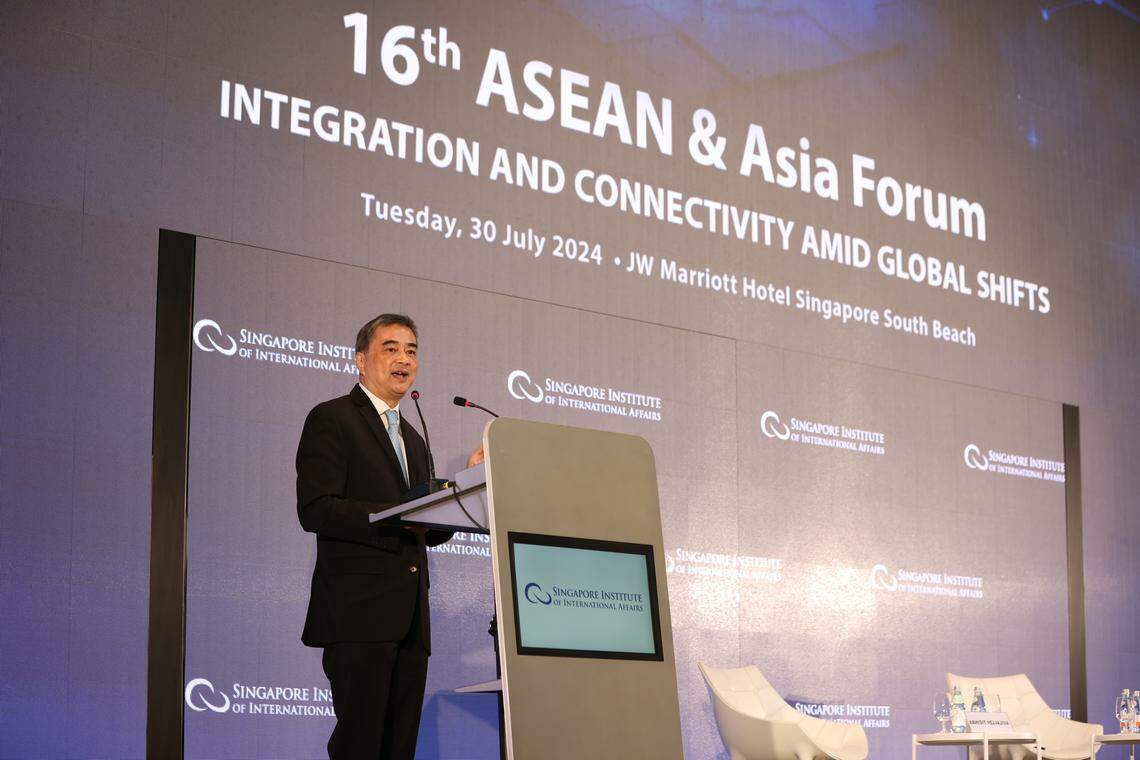ESCALATING geopolitical tensions have bolstered manufacturing activity and exports in Asean, strengthening the case for enhancing port and airport infrastructure and connectivity in the region, said Minister for Transport Chee Hong Tat on Tuesday (Jul 30).
Such enhancements will facilitate the flow of goods to end-markets, he said during his keynote speech at the Asean and Asia Forum organised by the Singapore Institute of International Affairs.
In response to these shifts, Singapore’s regional neighbours, such as Vietnam and Indonesia, have developed plans to position themselves as supply chain hubs.
But while better infrastructure across Asean will boost regional supply chain efficiency and resilience, it will also lead to greater competition, noted Chee. Regardless, competition and collaboration are not mutually exclusive, he said.
“In some areas, we may compete, but in many other areas, there are also opportunities to work together, and I think that’s important because if we adopt a zero-sum mentality… it’s going to make life very difficult for all,” he said later at the event.
Nevertheless, Singapore still has to strengthen its value proposition as a global supply chain hub.
A NEWSLETTER FOR YOU
Friday, 8.30 am
Asean Business
Business insights centering on South-east Asia’s fast-growing economies.
Refining information flows
Shippers and logistics providers can look forward to a new app that facilitates information-sharing, which will streamline movement across routes that use various modes of transport.
Currently, information such as airline and vessel availability and schedules are typically accessed through multiple channels, with some smaller companies doing this manually. Tracking also has to be done manually to allow for prompt responses to unforeseen changes.
This information asymmetry generates inefficiencies and suboptimal outcomes, which may also incur additional time and costs, said Chee.
The new app will address these issues by functioning “as an intermodal control tower to provide shippers and logistics providers the information they need to make decisions in a simplified and timely manner”, the minister said.
It will provide real-time data on flights and vessels, facilitate the booking of flights and sailings, and track vessel and flight statuses in real-time, Chee added. It will also push out early alerts of potential delays as well as provide cargo status visibility across different modes.
The Business Times understands that the prototype of the app, once developed, will be available to current members of the industry-led Alliance for Action coalition that was formed in March to co-develop solutions to bottlenecks in intermodal transshipments.
The committee includes the Ministry of Transport; logistics giant DB Schenker; port operator PSA Singapore; solutions provider Cargo Community Network; in-flight caterer and ground handler Sats; Singapore Airlines Cargo; and the Singapore Aircargo Agents Association.
Streamlining procedures
Separately, the government is also working with the industry to review rules and regulations to reduce regulatory compliance costs, said Chee.
In an effort to streamline land transshipment procedures, companies transshipping goods via land checkpoints will require only one permit from the first quarter of 2025, instead of two currently – one for import and another for export.
As Chee mentioned in his Committee of Supply Debate speech in Parliament on Mar 5, this move could save up to S$2 million a year.
This amount could be even higher if the volume of goods transshipped via Singapore’s land checkpoints increases in the future, he said.
Asean centrality
Another statesman speaking at the forum was former Thai prime minister Abhisit Vejjajiva, who delivered a speech on fostering the Asean community post-2025.

A future cannot be built through diversion, he said, citing the creation of new opportunities instead. He raised two broad ideas, the first of which is having the courage to tackle sensitive issues on integration, particularly the freedom of movement across borders.
“Now, I’m not naive enough to call for some kind of seamless movement across countries in the region, but surely freer movement of people must be on the cards,” he said.
“Is it not time that our governments begin to talk about some joint tax policies instead of competing and racing, perhaps to the bottom, to offer incentives at substantial cost to all of us?”
He added: “The second thing is, despite all the talk about connectivity and integration, we have to admit that most of our national governments are more focused on competing with each other, rather than collaborating when it comes to economic opportunities.”
The way he sees it, with the current global environment, the time is now for Asean to think about consolidating supply chains in key sectors, to increase the region’s competitiveness and economic security.
He believes that beyond technical and financial challenges, mindsets continue to hold the region back.
“The bottom line for all the more difficult questions for me is that until we make Asean citizens feel that they do belong to Asean and that we have a common future, a common destiny, it’s always… going to be difficult to get this kind of cooperation going.”




